- Home
- Melissa Marr
Carnival of Souls Page 9
Carnival of Souls Read online
Page 9
All the while, Kaleb stayed completely still, watching her, waiting for her.
Mallory felt half dazed as she walked away to grab a piece of paper and a pen. She wrote down her new address and then, while she was at it, she added her cell number. “You can call me too,” she said in an almost-calm voice. “If you want to talk or whatever.”
“I do.” He took the paper, read it, and then tucked it into his pocket. “I’ll call you as soon as I’m able. I can’t call when I’m away, but when I get back here . . . I’ll call.”
“You aren’t allowed to make calls from school? I get not being able to make calls in class, but you should be able to call in the dorms or the grounds or whatever.” She looked at him with renewed suspicion. “What do they do? Take your cell phones?”
“I don’t have a cell phone, but I can get one if you want me to.” He took her back into his arms. “I’m yours to command, Mallory.”
She started to laugh, but stopped when she saw that he wasn’t smiling. He stared at her with the sort of intensity that briefly made her want to flee, and then made her want to grab hold of him and never let go.
He stared into her eyes and promised, “I’m yours, Mallory.”
He didn’t add that she was his, but she heard it all the same—and believed it.
CHAPTER 11
WHEN AYA ARRIVED AT the carnival, she took a moment’s pleasure in the crush of bodies and chaos of sound. Ruling-caste girls weren’t to be at the Carnival of Souls unaccompanied, but because of Marchosias’ Competition, no one tried to enforce that rule with her. Belias would’ve, but he was gone. A wave of grief swept through her at that thought. It’s for the best. She hadn’t asked to be in this situation, but she was determined enough that she would force herself to do what she must.
“Witch teeth!” a hawker called out as she passed.
“Grave dirt,” another beckoned.
“I know what you are,” a crow-eyed Watcher murmured into her ear, only to vanish before Aya could catch her.
A prickle of fear made Aya scan the crowd. She doesn’t mean that. I have been careful. No doubt the woman was accusing Aya of caste failure, abhorrent behavior, or any number of missteps. Still, Aya’s gaze darted over the masked and unmasked, seeking but not finding the Watcher. All that she found was the normal carnival fare.
Vendors were selling the absurd, the unbelievable, and the mundane. A buyer could purchase vats of herbs, freshly butchered animals, and delicate shrouds within a few steps. Children of the established families were kept in sight by their minders. Pickpockets twisted through the crowds, risking broken hands or worse if they were caught. Scarlet-masked escorts lounged in opulent stalls catering to any and all tastes, and mind-altering medicinals were hawked by loud voices. A Spousal Emancipation, Exchange, and Dissolution Agency was advertised only by the suit-clad greeter in front of the shuttered booth. All around the carnival, transactions of varying degrees of legality and ethical questionability were happening. The City wasn’t a world that seemed beautiful to everyone, and Aya was able to admit to herself that it had flaws. It was her world though. She felt the peculiar hum of it inside her skin. She wanted to rule in it, to make it better, and then to keep it flourishing.
Without the land the witches had destroyed by creating the feral fecundity of the Untamed Lands, the castes struggled to coexist in an ever-shrinking city. The middle and lowest castes grew resentful of the same restrictions and sharp caste lines the ruling caste embraced. Consequently, Marchosias’ Competition was all the more important to them. For many daimons, it was the one chance to change the future, to survive when logic made clear they should’ve died by now—just as it was for her.
With that morose thought, Aya found a bench at the edge of the carnival and pretended to wait calmly for reports of Nic and Kaleb’s fight. Neither cur was the high-money bet to win, but curs were so unpredictable that she wasn’t looking forward to facing either of them. The upside was that they had both thinned the field considerably.
As Bel had.
No amount of training would replace the discipline of growing up as a cur. Kaleb and Nic had both had to fight to preserve whatever dignity they could.
“Nic is dead,” one of her informers said as he plopped down on the bench.
She looked at the boy. Like Kaleb had once been, he was a street scab. His hair was matted, and old scars ran down his neck and arm from what appeared to have been boiling liquid thrown on him at some point. The rough, scar-thick skin made him stand out, but for jobs that weren’t secret, he was still of use.
“And Kaleb?” She held a coin in her still-closed hand.
“Ripped open high enough up that he won’t be using his assets anytime soon.” The boy shuddered, but even as he did so, he was on to the practical matters: he stretched out his open hand. “Might be fatal. Might not. I can find out for extra.”
“Not much more, but a little extra something if you find out first.” Aya released the coin, and before it hit the scab’s open palm, he’d plucked it out of the air and secreted it away.
“Don’t cross his threshold,” she warned before the scab left.
Kaleb’s sole packmate, Zevi, wasn’t vicious as a rule, but she’d seen him leap to Kaleb’s defense against attackers far too big to cross overtly. If Kaleb was seriously injured, Zevi would be even more rabid in his already heightened protectiveness.
A moment after the scab nodded and vanished into the throng, Marchosias swept through the market with the grace of a wolf prowling his territory. The thrill of seeing him out in public rippled over the crowd—at least those parts of the crowd who weren’t slipping away to avoid his notice. Marchosias didn’t have to offer coin for what he wanted. He was their lord and master, their judge and jury, their terror or bliss, their savior or destroyer. Whatever he wanted was his.
Aya slipped to the side, watching him. It wasn’t a matter of avoiding his attention: she’d killed so many fighters that he’d known who she was for months. That didn’t mean that she wanted him looking at her as if she wore a red mask.
Another of the street scabs appeared at her side. “Kaleb’s not dead, probably won’t die from this, but he’s not going to be in any shape to fight next week.”
A scuffle across the street heralded the beginning of one of Marchosias’ announcements. He stood atop a small riser and surveyed the crowd growing around him. He saw her, and he beckoned her to him.
Silently, Aya handed the necessary coin to the scab, and with her head held high, she strolled toward the crowd watching Marchosias.
“We are nearing the end of the contest,” Marchosias began. “I am honored by the ferocity of my people.” The crowd cheered. “This competition has been a beautiful, bloody addition to the Carnival of Souls.” The din of cheering rose higher. Even those who didn’t enjoy the savagery of the competition knew to cheer whatever Marchosias declared to be good.
“Upon meditation, I have decided to add an incentive to the final rounds.” Marchosias’ gaze fastened on Aya.
He was a good ruler, a daimon worthy of her loyalty, but she felt a creeping sense of dread as he watched her approach.
“The winner of the competition will be awarded the right to join my family’s line to theirs,” he announced. “My daughter is alive, and she will be returned to The City by her eighteenth birthday.”
The cheers grew near deafening.
Marchosias let them continue as Aya waded through the crowd. When she was standing in front of him, he held up a hand for silence.
Dread evolved into terror when he announced, “Not all of the contestants are male, though, so to keep it fair, I have decided that if Aya wins, she will bear my next child.”
The crowd cheered again, and she wasn’t sure if it was because Marchosias was putting her back into what many considered a woman’s rightful place or because he was looking out at them expecting them to cheer. Perhaps, it was both.
Aya, however, could not have been more devastated. Th
e very thing she’d fought to avoid was suddenly the prize. She tried to keep her emotions from her expression, but apparently failed—or perhaps it was simply her silence that revealed her lack of enthusiasm.
“Are you not honored, girl?” Marchosias prompted.
She ignored the crowd behind her. “I am honored by your notice, Marchosias, but if I win, I won’t have time to bear a child.”
As he stepped down from the riser, Marchosias smiled like the wolf he resembled in his other form. “Do you expect to win?”
“Every fighter does,” she hedged.
The assessing glint in his eyes didn’t dim. “The prize for winning is to join lines with mine. As with any of those I’ve taken to mate, if you bear my son, you will be my next wife.”
Aya ignored the question of marriage, and instead focused on the larger issue. “If any of the other fighters win, they will have your missing daughter. She will raise the child, so they do not have to stay in chambers with a child. For them, it is doubly a prize.”
He smiled again, and it took more effort not to flinch than it ever did in fights. “Be careful, Aya. It sounds as if I am not a prize.”
She bowed. “For a daimon who wants to bear a child, you are the best of rewards, but I do not intend to bear a child, my lord. I would rather die in the fights.”
He put his hand flat on her abdomen. “We all have a duty to The City.”
When he turned away, Aya fled. There were fates worse than being a breeder, but she wasn’t sure there were any fates that would be worse for her. Witches’ magic, spells she couldn’t overcome, meant that marriage or a breeding ceremony would make any female fertile. She would be unable to stay childless if she went through the ceremony, and a child would reveal the secret that would result in her inevitable death or enslavement.
CHAPTER 12
AFTER KALEB HAD DISCOVERED that Mallory felt like pack, that she felt like she was his, he knew he had to try to talk to Haage. Crossing Haage was the sort of action that ended a black-mask’s career. Most often, the only reason to cancel a contract was the assassin’s death. To add pressure to an already explosive problem, Kaleb wasn’t at the carnival for but a few minutes before he heard about Marchosias’ pronouncement. If Mallory had been found by someone who reported to their ruler, Kaleb’s time was even more limited. Unless he could get to Mallory before she was brought to The City, he risked crossing both Haage and Marchosias. Even if he could reach her first, he’d have to confess what he was. Every direction he could turn felt deadly.
He mulled solutions as he walked from assassin stall to assassin stall. There were kinder words etched on the stalls, but they were what they were. Calling them “conflict resolution consultants” didn’t change the nature of the service they provided. Murder for hire was a thriving business—one that had provided steady work for him for several years.
At the third stall, Kaleb found Haage. The older daimon was easier to locate than most assassins: he never wore a mask. With Haage, his career was a sign of pride. His ability to do his work without needing a mask spoke of skill and brutality, both prized traits in The City.
The two daimons with him, however, were masked from brow to chin. Vibrant blue masks protected the customers’ identities as they solicited murder; despite that, they still stepped farther into the shadows when Kaleb approached.
Haage turned his back on them with the confidence of someone who knew he was terrifying. His meaty arms and bare chest were covered with so many scars that the flesh was raised in intricate textures in more than a few places. He wore those scars with the pride that came from killing nearly every daimon he’d fought. The one notable exception was Marchosias. Years ago, long before Kaleb had been born, there was even less chance of caste movement. Marchosias and Haage had led the daimons who’d routed the witches from The City, and then Marchosias had led his troops to the palace and made himself ruler. Haage had thought his brother would reward him—and he had, making Haage head of the militia, a role Haage had subsequently lost by trying to repeat his brother’s action and declare himself ruler. It had been treason, selfish power-grubbing of the sort that should have resulted in Haage’s death. Instead, Marchosias had laughed and offered forgiveness.
“I wondered where you’d been,” Haage said by way of greeting.
“Around.”
“You’re a credit to our kind in the matches,” Haage allowed. “The last cur to nearly win was corrupted by my brother.”
The compliment would’ve thrilled him a month ago. Today, it meant nothing. Mallory was the future.
“I can’t kill her,” Kaleb began. He didn’t get any further before Haage’s fist smashed into his mouth.
Haage grabbed Kaleb’s shirt, holding him upright and shaking him. “You seem to forget what you were sent to do.”
“I didn’t forget.” Kaleb spat the blood from his mouth. “You said find her. I did. You said watch her. I am.”
Haage dropped Kaleb. “And when I say kill her, you will.”
“Marchosias has found her though.” Kaleb stayed on the ground. “And I’m not exactly anonymous these days.”
“She’s old enough to breed. That means he’ll have two possibilities for an heir.” Haage scowled.
A witch-wrought spell meant that some ruling-caste daimons were able to have only one living child every eighteen years, so unless the child died, no more children could be born until that child reached majority. This meant that some children were left to die—or were simply killed—to allow for a new child to be born. For years, the common knowledge in The City was that Marchosias’ daughter had died. When no new heir was born, Haage had begun to suspect that the child, a daughter, lived, but he had wanted her to live so that no new heir would be born. “Better a girl child than a useful heir,” Haage had pointed out. Unfortunately for Mallory, she would reach majority in the next year. That would mean that not only could Marchosias father a new child, but he could also allow his daughter to be bred by a daimon he found worthy.
Kaleb didn’t bother getting up. “She doesn’t know what she is, and none of your other black-masks know where she is.”
Haage said nothing for several minutes. His gaze traveled slowly across the stall. The few remaining occupants walked toward the exits. In moments, the slap of one of the heavy cloth doors signaled the departure of the last of the customers and killers. Daimons who dealt in the business of death were more discreet than a lot of The City’s residents, but they were also cautious. Discretion and caution helped increase survival odds.
Haage stared down at Kaleb. A grimace came over his jowly face, and he made a noise that sounded like a cross between a grunt and a snort. “You accepted the job. Word everywhere is that you’re too proud to take easy jobs, but you’re a good spy and a better killer. I picked you. Are you breaking the contract?”
“I did the job. I found her.” Kaleb came to his feet slowly. The injuries from his fight were aggravated by Haage’s rough treatment, and the pain in Kaleb’s leg throbbed like an extra heartbeat. Even at his best, he didn’t know if he could take Haage, and he was definitely not at his best.
Haage folded his massive arms over his heavily scarred chest. “And you knew that the contract would include eliminating her when she reached her majority or if he got close to retrieving her. The rules of the competition changed. That means he knows where she is and that she needs to die. It’s not complicated; now, is it?”
Kaleb bowed his head briefly, offering the submission that Haage sought. “I suppose not. You’ll need to pay more if I’m to be killing her. . . . Unless you have someone else who can find and kill her?”
Haage shook his head, but he was grinning. “Now, that’s the cur I hired.”
CHAPTER 13
ADAM TRAVERSED THE TOWN of Franklin with the same caution he’d once learned as a child in The City. The human world was a lot different from the world where he’d been born and spent his formative years. The primary similarity was that both when they liv
ed there and when they’d fled here, he’d known to obey his sister if he wanted to survive. She was a stickler about caution.
That obsession with caution was nowhere as obvious as it was at the main office. If Mallory were a witch, these were the places that would be safest for her. Since she was a daimon, taking her there was dangerous. The tears in her wards from encounters with daimons he could repair—and he had, every time she’d fought daimons—but if she entered any of the offices, the tears would be too extreme to patch. All of the spells he’d woven onto her aura would be stripped away and the daimon nature he’d worked so hard to hide all of these years would become manifest. At best, Mallory would discover what she was and be exposed to the daimons tracking her. At worst, she’d be dead from the witches’ protection spells and wards.
To him, however, the barriers outside the building were not prohibitive. The air felt weighty as he walked, as if he were wading through water, but it didn’t stop him. If Evelyn wanted to stop him, she could. That thick air could become solid, if necessary, but he was there with her permission, so the barrier was nothing more than a reminder that he was entering one of the most protected areas in this world.
Adam opened the door, registering the gentle shock as the spell identified him. Once inside, there were witches aplenty who could deal with any intruder, but it was unlikely that a daimon would be able to get this far, and any human carrying weapons would be detected and stopped at the door.
The pretty young witch at the reception desk smiled at him as he handed over his company ID card. She scanned it, nodded, and handed it back. “She’s in her workroom, ninth floor, third door on the left. Let me know if you need anyone to show you around the offices or the town.”
“No, but thank you.” He smiled politely. He’d been flattered by the openly inviting offers of witches when he was younger, but he was a father and by law still married to Selah. He hadn’t violated that vow ever. To do so would put the validity of his marriage in question—which would then put his paternal claims to Mallory in question. If Mallory’s biological father, or even Selah’s sisters, thought they had grounds to contest his paternal rights, they’d do so in an instant. They didn’t, but there were still daimons who tried to snatch her away, either to curry favor with their ruler or for whatever other political reasons they had. Those threats he handled. Mallory’s birth family was another matter. Marchosias was inflexible in his adherence to the law, so much so that he still used magic in The City to bind contracts. So, unless she was married, Mallory was Adam’s daughter until she was eighteen. That would change if Adam broke his vows to Selah. No witch, or human, was worth endangering Mallory.

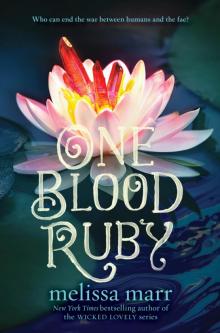 One Blood Ruby
One Blood Ruby Desert Tales
Desert Tales Faery Tales & Nightmares
Faery Tales & Nightmares Enthralled: Paranormal Diversions
Enthralled: Paranormal Diversions Wicked Lovely
Wicked Lovely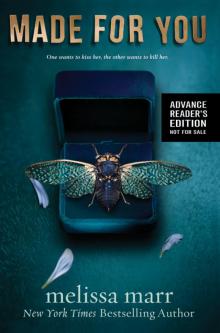 Made for You
Made for You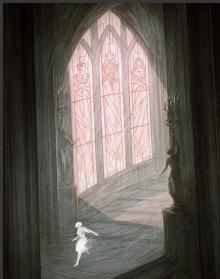 The Maiden Thief
The Maiden Thief Two Lines
Two Lines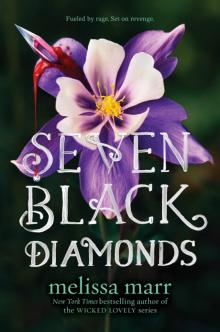 Seven Black Diamonds
Seven Black Diamonds Love Struck
Love Struck Guns for the Dead
Guns for the Dead Radiant Shadows
Radiant Shadows Ink Exchange
Ink Exchange Darkest Mercy
Darkest Mercy Stopping Time and Old Habits
Stopping Time and Old Habits Carnival of Secrets
Carnival of Secrets Carnival of Lies
Carnival of Lies This Fond Madness
This Fond Madness Graveminder
Graveminder The Arrivals
The Arrivals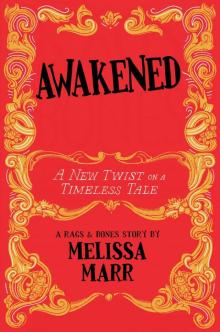 Awakened: A New Twist on a Timeless Tale
Awakened: A New Twist on a Timeless Tale Cold Iron Heart: A Wicked Lovely Novel
Cold Iron Heart: A Wicked Lovely Novel Summer Bound: A Wicked Lovely Story
Summer Bound: A Wicked Lovely Story The Wicked & The Dead (Faery Bargains Book 1)
The Wicked & The Dead (Faery Bargains Book 1)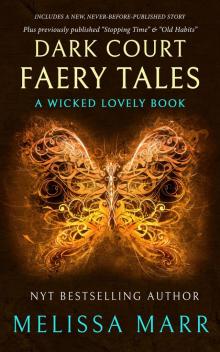 Dark Court Faery Tales
Dark Court Faery Tales of Maidens & Swords
of Maidens & Swords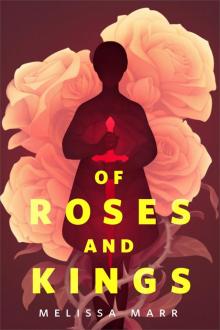 Of Roses and Kings
Of Roses and Kings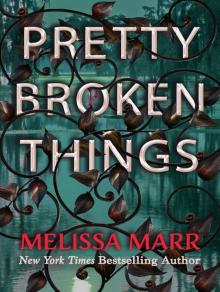 Pretty Broken Things
Pretty Broken Things Enthralled
Enthralled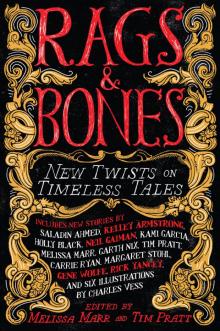 Rags & Bones
Rags & Bones Ink Exchange tf-2
Ink Exchange tf-2 Stopping Time
Stopping Time Tales of Folk & Fey
Tales of Folk & Fey Hex on the Beach
Hex on the Beach Wicked Lovely Free with Bonus Material
Wicked Lovely Free with Bonus Material Wicked Lovely tf-1
Wicked Lovely tf-1 Wicked Lovely with Bonus Material
Wicked Lovely with Bonus Material Carnival of Souls cos-1
Carnival of Souls cos-1 Radiant Shadows tf-4
Radiant Shadows tf-4 Darkest Mercy tf-5
Darkest Mercy tf-5 Carnival of Souls
Carnival of Souls Desert Tales: A Wicked Lovely Companion Novel
Desert Tales: A Wicked Lovely Companion Novel Fragile Eternity tf-3
Fragile Eternity tf-3 Old Habits
Old Habits Stopping Time, Part 2
Stopping Time, Part 2 Stopping Time, Part 1
Stopping Time, Part 1